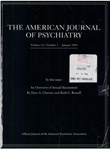Is sleep deprivation useful in the treatment of depression?
Abstract
OBJECTIVE: The authors critically reviewed the literature on clinical applications of sleep deprivation in the treatment of depression. DATA COLLECTION: They included all studies using sleep deprivation for clinical purposes, with the exception of treatment studies that did not provide follow-up beyond a night of recovery sleep. They focused on six uses of sleep deprivation: 1) to potentiate response to antidepressant medication (13 studies), 2) to hasten the onset of action of antidepressant medication or lithium (five studies), 3) to prevent recurrent mood cycles (four studies), 4) as an alternative to antidepressant medication (five studies), 5) as a diagnostic probe (two studies), and 6) to predict response to antidepressant medication (nine studies). FINDINGS: Although the literature appears to demonstrate the efficacy of sleep deprivation as a potentiation strategy, these treatment studies have substantial methodological shortcomings. Well- designed pilot studies indicate that sleep deprivation may hasten the onset of action of thymoleptic medications. Sleep deprivation may prevent premenstrual mood swings, and response to sleep deprivation may differentiate depressive pseudodementia from primary degenerative dementia with depression. Studies attempting to use sleep deprivation to predict response to antidepressant medication have yielded inconsistent results. CONCLUSIONS: Given the noninvasive nature of sleep deprivation, it would be useful to determine if even a small subset of refractory patients respond to it. The authors suggest future research directions to determine the usefulness of this potential treatment.
Access content
To read the fulltext, please use one of the options below to sign in or purchase access.- Personal login
- Institutional Login
- Sign in via OpenAthens
- Register for access
-
Please login/register if you wish to pair your device and check access availability.
Not a subscriber?
PsychiatryOnline subscription options offer access to the DSM-5 library, books, journals, CME, and patient resources. This all-in-one virtual library provides psychiatrists and mental health professionals with key resources for diagnosis, treatment, research, and professional development.
Need more help? PsychiatryOnline Customer Service may be reached by emailing [email protected] or by calling 800-368-5777 (in the U.S.) or 703-907-7322 (outside the U.S.).



